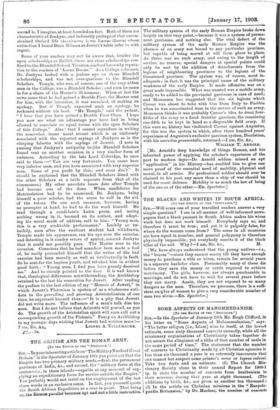THE BRITISH AND THE ROMAN ARMY.
[TO THE EDITOR OF THE "SPECTATOR."1
SIR—In your interesting article on" The Military Needs of Great Britain" in the Spectator of January 10th you point out that the Empire has two primary military needs,—first, the permanent garrisons of India, &c., and second, the "military force at the centre—i.e., in these islands—capable at any moment of sup- plying an expeditionary force for service outside the Empire." You probably would not insist on the employment of the last three words in an exclusive sense. In fact, you yourself quote the South African Expedition as a case in point. That being so, the Roman parallel becomes apt and not a little instructive. The military system of the early Roman Empire broke down largely on this very point,—because it was a system of perma- nent garrisons, and nothing else. The vital defect of the military system of the early Roman Empire was the absence of an army not bound to any particular province, but capable of being moved at will from place to place. As there was no such army, and owing to the length of service, no reserve, special dangers at special points could only be met by the addition of detachments from the legions of neighbouring provinces to the legions of the threatened province. The system was, of course, most in- adequate ; in fact, it was the principal cause of the military weakness of the early Empire. It made offensive war on a great scale impossible. What was wanted was a mobile army, ready to be added to the provincial garrisons in case of need; and Mommsen has suggested that the six legions which Caesar was about to take with hint from Italy to Parthia when he was assassinated were in the nature of such an army. Mommsen thinks it was probably Caesar's idea to treat four- fifths of the army as a fixed frontier garrison, the remaining one-fifth to be kept in hand as a disposable field army. If this were so, history has vindicated Caesar against Augustus, for this was the system to which, after three hundred years' experience of Augustus's exclusive garrison system, Diocletian, with his exercitus praesentalis, returned.—I am, Sir, &c., WILLIAM T. ARNOLD. [Mr. Arnold's deep knowledge of things Roman, and his inherited power of applying the scholar's experience of the past to modern days—Dr. Arnold seldom missed an apt "application" in his History—has enabled him to give one more proof of the essential need of mobility, physical and moral, in all armies. No professional soldier should ever be chained to his post, any more than a ship of war should be used for coast defence. Mobility is as much the law of being of the one as of the other.—En. Spectator.]










































 Previous page
Previous page